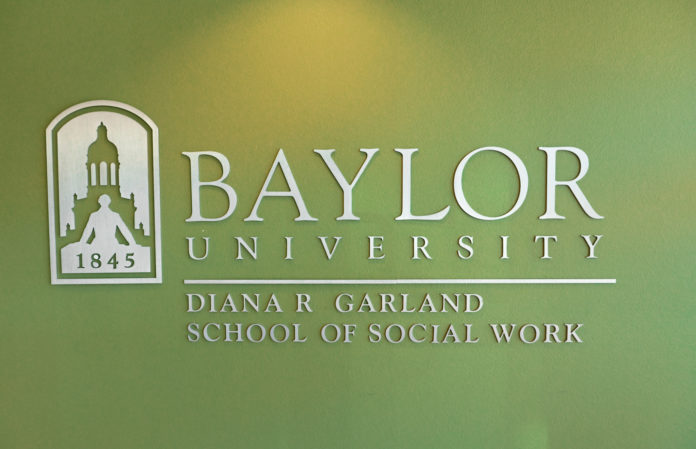
By Jenna Fitzgerald | Copy Editor
The Diana R. Garland School of Social Work is now streaming on Spotify.
On Jan. 31, Kerri Fisher — senior lecturer in the School of Social Work — and Kayla Mize — Waco regional director for child hunger outreach at the Baylor Collaborative on Hunger and Poverty — launched their new podcast entitled “So Far, So Good.“
According to the School of Social Work’s Facebook page, the podcast is meant “to model anti-oppressive engagement and critical self-reflection for the Baylor community and beyond.”
Fisher said in each episode, the hosts invite a guest who brings a piece of art, whether it be visual, musical or film. After the guest introduces themselves and their art, Fisher and Mize take them through the tripartite identity model to uncover what their art can teach them about the human experience.
“The tagline is ‘engaging diversity one story at a time,’” Fisher said. “Our interest is in helping people to understand the ways that all humans are similar, all humans are different and all humans have particular identities that show up in particular ways. And we can borrow from other people’s experiences through story and art.”
Mize said they decided to create the podcast last spring after serving as co-chairs of the School of Social Work’s Race Equity Work Team and after having taught the school’s Human Diversity and Leadership class.
“While much of the work that came out of [the Race Equity Work Team] was very practical ways to engage diversity, equity and inclusion — like amending or improving policies, procedures and practices — I think that we were also looking for ways to engage people on an individual level in ways that weren’t just another training, something that helps us to kind of focus on the beauty, the mystery, the joy of being human and the different ways that we are human,” Mize said.
According to the podcast’s Anchor page, its name “represents how far we all are from becoming completely anti-oppressive but also how good it is to take even small steps toward inner work and systemic change.”
“[Mize] and I were trying to think of a name that captured the dynamic process of engaging diversity and difference,” Fisher said. “It’s not like I put one foot in front of the other, and all of a sudden, I’m so far from my old self. It’s actually that we’re taking steps forward, we’re taking steps back. So as long as we are taking action, we would say that’s ‘so good’ even if we feel ‘so far’ from where we want to be.”
Fisher said all guests for the first season were faculty and staff of the School of Social Work. However, she said she and Mize were cognizant of featuring diverse voices and varied types of art in those episodes.
“In future seasons, I’m really excited about the additional layers of difference that we can bring into the podcast, because next season — should we be blessed to have one — we’ll probably move outside of the School of Social Work,” Fisher said. “Obviously, if we’re mostly talking to people who work at Baylor in a faculty or staff position, that means that we might have fewer representations of someone who’s coming from a lower socioeconomic status at this point in time. We might have fewer queer voices represented at this point in time. Obviously, we have fewer voices of people who don’t identify as Christian. So in the future, when we move beyond interviewing Baylor employees, we’ll have some opportunity to listen to even a broader range of guests.”
Mize said some of her favorite parts about working on the podcast have been the excitement of the unknown and the opportunity to watch conversations unfold before her — something that Fisher echoed when remembering how Dr. Crystal Diaz-Espinoza, the guest on the first episode of the podcast, highlighted her love for football as she was introducing herself.
“I had an experience in that moment like I want the listener to have, which is that I didn’t really remember or have any idea that [Diaz-Espinoza] was a big sports fan, nor was that what I was thinking of her whenever I would engage with her on a day-to-day basis,” Fisher said. “I think of her as a feminist. I think of her as an admissions specialist. I think of her in all these professional ways. But I don’t think of her as a sports fan, even though she is a huge sports fan and a huge football fan. So that illuminates for me, ‘What are some of my conclusions that I jump to? How do I keep people in a singular box instead of the fullness of who they are?’”
Fisher and Mize both said they hope “So Far, So Good” can serve as a starting place for people as they embark on their journey to engage diversity.
“Any time we’re engaging with art from people who have identities that are different from ours, it helps us to expand our understanding of the world,” Mize said. “It helps us to expand our understanding of what it means to be human. It helps us to see a wider array of experiences and the beauty in those things. So I think that additionally, I hope that a takeaway would be just how unique and wonderful and beautiful our world is because of how diverse it is.”





